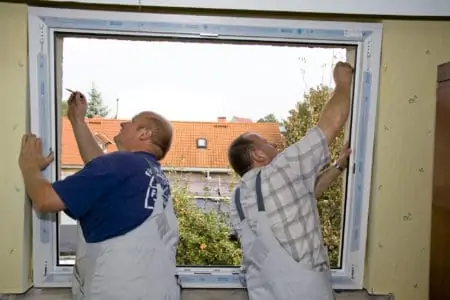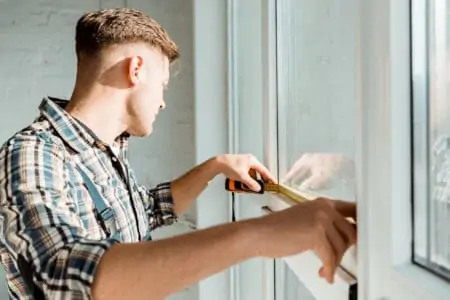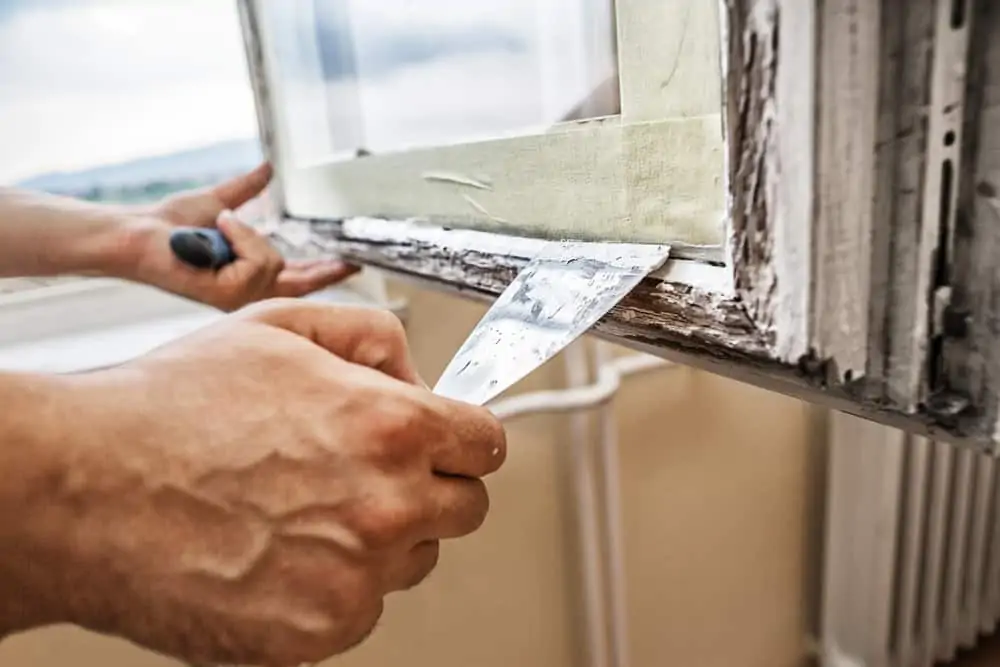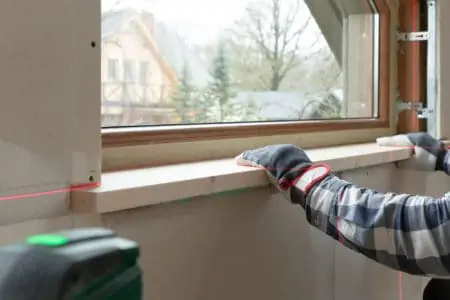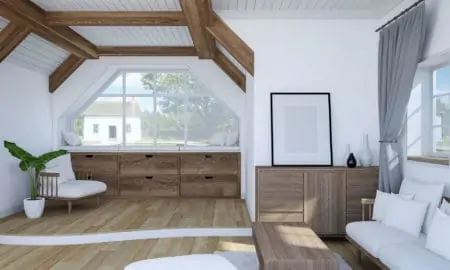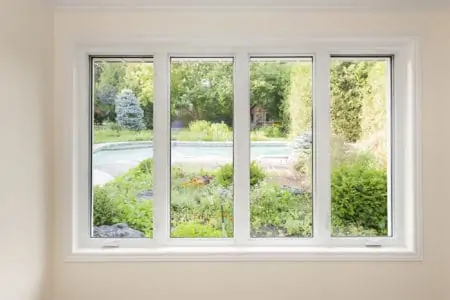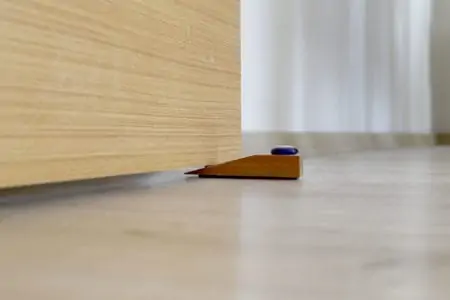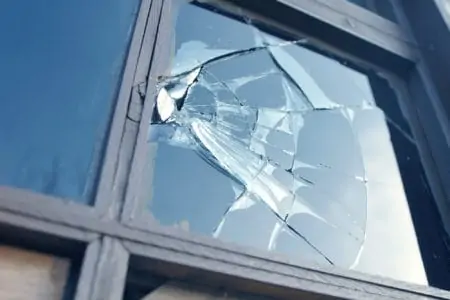Asking “how much does it cost to replace windows?” is a fair question, especially when your old windows are leaky. Maybe they don’t operate like they used to, or you are spending more on heating bills?
Window replacement costs depend on how many windows you have and the type of windows you want. We give you all the information you need, including how to calculate the cost to replace windows.
Key Takeaways
- Average window replacement cost in the US is $450 per window with prices ranging from $290 to $1,800 depending on the window type and quality.
- Factors affecting the cost include window type, number of panes, building age, window location, and frame material.
- Energy-efficient windows like double or triple-pane windows can save up to 80% in energy loss compared to single-pane models, resulting in lower heating bills.
- Alternatives to replacing windows include retrofitting and repairing, which can be more affordable options depending on the condition of the existing windows.
- The Average Cost to Replace Windows
- How Do You Know When to Replace Your Windows?
- Factors that Affect the Cost of Window Replacement
- Standard Window Sizes
- Window Prices By Type
- Frame Material By Price
- How to Save Money When Replacing Windows
- Can I Replace a Window Myself?
- Affordable Alternatives to Replacing Windows
- FAQs
- Take the Pain Out of the Pane
The Average Cost to Replace Windows
The average window installation cost in the US varies according to several factors. First, the type of window you want makes a difference to the budget, while the number of windows influences the figures.
The national average is about $450 per window, although prices range from $290 for budget windows to $1,800 for premium options. A typical three-bedroom house will cost you between $3,000 and $10,000.
Here’s a handy guide to average prices by window type:
| Average Costs | Single-Pane | Double-Pane | Single-Hung | Double-Hung |
| Average Price Range | $290 to $460 | $450 to $1,000 | $100 to $500 | $150 to $600 |
| Average Cost Per Window | $375 | $725 | $300 | $375 |
| Average Cost for 3-Bed House With 10 Windows | $3,750 | $7,250 | $3,000 | £3,750 |
| Cost for 25 Windows | $9,375 | $18,125 | $7,500 | $9,375 |
| Labor Costs | $50 per hour | $50 per hour | $57.50 per hour | $137.50 per hour |
How to Calculate Replacement Window Costs
Several factors affect how you calculate the cost of fitting new windows, and the type of window you want makes a difference. Single-hung windows are cheaper, at around $300 per window, while double-hung models average at $375.
You then need to factor in whether you want single or double-pane windows. Single-pane windows are the least efficient, letting more heat escape, while double-pane models are up to 80 percent more effective.
A typical single-pane window ranges from $290 to $460, while the average price for a double-pane window is $725.
The next factor is the number of windows you have. A typical three-bedroom home has an average of one window every 100 square feet.
To calculate the total cost of replacing every window, multiply the cost of the window with the number in your home, based on square footage.
Check out our quick reference chart:
| Home Square Footage | Number of Windows | Low Estimate | Average Estimate | Premium Price Estimate |
| 1,000 | 10 | $3,000 | $5,000 | $8,000 |
| 1,500 | 15 | $4,500 | $7,500 | $12,000 |
| 2,000 | 20 | $6,000 | $10,000 | $16,000 |
| 3,000 | 30 | $9,000 | $15,000 | $24,000 |
| 4,000 | 40 | $12,000 | $20,000 | $32,000 |
| 5,000 | 50 | $15,000 | $25,000 | $40,000 |
Another factor at play is the window frame material. Vinyl is the cheapest, while clad windows are the most expensive. Clad windows have a wooden or aluminum frame under vinyl trim and are the most efficient for heat loss and relatively maintenance-free.
Here’s an at-a-glance chart to explain the cost differences between the different materials:
| Material Type | Average Cost per Window |
| Vinyl | $100 to $800 |
| Composite | $280 to $950 |
| Wood | $200 to $1,000 |
| Aluminum | $100 to $1,400 |
| Fiberglass | $150 to $1,400 |
| Clad | $325 to $2,000 |
The final consideration is the labor costs. Most window companies charge between £35 and $65 per hour. It takes between two hours and a half-day to install the average double-pane window.
So, multiply the number of windows in your home by the average of $50, and you have an estimate of labor costs.
How Do You Know When to Replace Your Windows?
Your windows are crucial in the fight against heat loss and keeping rainwater out, so knowing when to replace them is vital. But what are the tell-tale signs that your windows are drafty and inefficient?
Heat Loss
Heat loss is one of the biggest signs that your windows need replacing. As they age, they become leaky, and heat escapes. If you’ve noticed an uptick in heating costs, you can probably blame your windows.
Top Tip
Light a candle and move it slowly in front of your window. If the flame flickers or goes out, you have an air leak. Concentrate on the frame, trim, and joints because this is where the weak spot is likely to be.
Difficulty Operating the Window
Windows become challenging to open for several reasons. In an old house that has settled around the frames, the mechanisms become tricky to operate. The frames may also have warped through prolonged heat, cold and general age, which means they don’t lock correctly.
This is a security issue as well as an energy efficiency problem. Your windows should open fully with ease and create a tight seal when closed.
Damage
Windows are fragile, and cracked glass allows heat loss and rainwater to get into your home. Broken glass can also pose a safety and security risk. The frames could be moldy or rotting, which is not only unsightly but also a health risk.
Mold spores irritate breathing conditions like asthma and could lead to lasting lung damage if left untreated. If you notice any of these signs, it is probably time to replace the windows.
Exterior Noise Pollution
If you’ve been turning up the TV and wondering if you are going deaf, it could also be because the exterior noise pollution has increased. Leaky and damaged windows not only let the heat out and the water in, but they also let outside sounds into your home.
New double or triple-glazed windows reduce exterior sounds by canceling out noise vibrations.
Hear This
A double-pane window can reduce exterior sounds by up to 50 percent.
Single-Pane Windows
Single-pane windows are the least efficient, as they offer the most limited sound reduction. By replacing them with double-pane windows, you make it easier to maintain steady heat inside, and you could potentially improve efficiency by 80 percent.
The initial installation costs will be considerably more, but you could save hundreds of dollars in reduced heating bills every year.
Factors that Affect the Cost of Window Replacement
Unless you’ve been routing down the back of Jeff Bezos’s sofa looking for a spare million, you need to know what factors affect the costs. Window replacement is not cheap, and the prices vary depending on a series of considerations.
Size of Window
Larger windows cost more money. If you want to frame the view of the mountains with a large picture window, get your wallet out. New homes have a standardized window size, which means you can buy your windows off the shelf.
Older houses are not as simple. Their window openings will be non-standard sizes, which means all your windows will need to be made to measure. Think of it like buying an outfit off the peg compared to one tailored to your measurements.
Number of Panes
Single-hung windows are cheaper than double-hung models, with a cost difference of as much as $400 or $500. Bay windows are expensive, costing between $500 and $2,500 because the window company will charge you by the number of panes.
A bay window will typically have three glass panels that protrude out from the wall of the building. It is not uncommon for each panel to include two panes of glass, making a total of six windows. Compare that to a standard window, and you can see why it costs more.
Single Vs. Double Vs. Triple-Pane
As we’ve already covered, single-pane windows are the cheapest. They lack heat retention and are the most likely to let noise pollution filter inside your home. Double-pane windows cut that noise pollution significantly.
They are also more efficient at controlling a steady temperature within your home. You should expect to pay between $450 and $1,000 for double-pane windows, depending on the size and type you want.
Triple-pane windows remove almost every exterior sound. A volcano could erupt, and you will still sleep like a baby (and we don’t mean in a diaper). They are the most thermally efficient of all the window types, but you pay a small fortune for all that energy saving.
Expect to pay a minimum of $500 for a medium-sized window. However, this cost could rapidly increase if you choose more expensive frames and larger windows.
Building Age
Older homes (typically 60 or 70 years old) will come with a new set of challenges. The windows will be non-standard size, which means they will need to be made to measure. You may also be restricted to the style of window you can choose for aesthetic reasons.
Age Matters
Local building codes cover historic buildings, which might restrict you further, and older homes may need more significant repairs.
Window Location
The location of the window significantly alters the costs. A basement window replacement will cost you between $250 to $1,000, and basement egress windows could be a maximum of $5,000.
This is because egress windows are an escape route for basement bedrooms in the case of an emergency. Replacing windows on upper floors also increases the amount you pay because it requires additional equipment and labor time.
Standard Window Sizes
While it is challenging giving an average cost for window sizes because of the variables involved, the cheapest method is replacing like for like. It doesn’t involve increasing the opening size.
There are so many styles, sizes, and window types to choose from; you should probably speak to your local window installation company.
However, the most common window sizes are:
- Wood: 18 to 60 inches wide and 18 to 48 inches high.
- Vinyl: 18 to 48 inches wide and 18 to 36 inches high.
Window Prices By Type
Besides the cost of the frame and the window’s location, the type of window you choose affects the overall costs. And with so many window types to choose from, there is scope for considerable price variance.
Single-Hung Windows
The average price for replacing a single-hung window ranges from $100 to $500, making it a popular budget choice. A single-hung window has the top part fixed while the bottom half moves up and down.
Double-Hung Windows
You should expect to pay between $150 and $600 for a double-hung window. The top and bottom halves move up and down, and premium units allow the windows to swing inwards too.
Full-Frame Windows
Full-frame windows are often called picture windows because they consist of large glass panes that frame the scene outside. These windows rarely open because they are designed to encapsulate the view.
You should expect to pay between $80 and $500 for a full-frame window.
Casement Windows
The typical costs of a casement window range between $200 and $1,000, depending on the material you choose for the frame. These types of windows are typically found near ceilings and basements. They open from left to right via a crank handle to leave a wide opening.
Basement Windows
Basement windows cost between $50 and $500, depending on their size. Most are at the cheaper end of the scale because basement windows are often small openings. They are fixed windows used to let extra light into dark spaces.
Egress Windows
Egress windows are compulsory as part of your local building code if you intend to use the basement as a bedroom.
They can be fitted anywhere in the house and typically cost between $500 and $2,500. However, in a basement, the price soars to $5,000 because these windows are an essential escape route in an emergency.
Frame Material By Price
From wood to vinyl and aluminum to composite, the frame you choose also affects the price. Each has its merits, but you wouldn’t necessarily use vinyl frames in an older house or wooden frames in a sleek cubist building.
Vinyl Frames
Vinyl frames are the most inexpensive, and yet they are durable, reliable, and also energy-efficient. You should expect to pay between $100 and $800 per window.
Wooden Frames
The average cost of wooden frames ranges from $200 to $1,000. Some historic buildings require wooden frames because they offer a classic architectural look.
Composite Frames
Composite frames are constructed from a mixture of PVC polymers and wood fiber to create a maintenance-free window frame. It makes them one of the most durable of the window types. You should expect to pay between $280 and $950.
Aluminum Frames
Aluminum frames look classy and don’t react to moisture, making them incredibly rugged. However, they lack insulating qualities, which can cause problems with internal condensation on cold mornings.
You should expect to pay between $100 to $1,400 for high-end frames.
Fiberglass Frames
Fiberglass is the second most expensive of all the window frame options. It has better insulating qualities than vinyl and is more durable than the other types. For this reason, they cost between $150 and $1,400.
Clad Windows
Clad windows top the price list because they are a combination of wooden or aluminum frames covered with vinyl trim. This makes them durable and the best option for fluctuating temperatures as well as coping with UV rays.
Expect to pay between $325 to $2,000.
How to Save Money When Replacing Windows
There are always ways and methods of saving money when it comes to replacing your windows. We all want to spend smarter given a choice, but how do we do it?
Go for Efficiency
While the initial costs of energy-efficient windows are significantly higher than standard ones, the savings come later. Double or triple-pane windows can save as much as 80 percent in energy loss compared to single-pane models.
That equates to hundreds of dollars in saved heating costs every year.
Buy In Bulk
Rather than purchasing one or two windows at a time, the installer may negotiate a discount for a bulk buy if you replace all your windows. While the initial spend is counterintuitive for saving money, it reaps the rewards when breaking it down to individual window costs. And you get all your windows done at the same time.
Think About the Warranty
You need to think about what might happen further down the line rather than today. Your new windows will be guaranteed, as will the installation work. Negotiating or shopping for the best warranty ensures you save money on possible expensive repair costs.
Choose Frame Material Carefully
Your new window frames look great, but what will they look for in a few years from now? Choose a material that best suits your environment. If you live by the coast, select something that doesn’t react with saltwater.
If you live in a cold environment, pick a material that can cope with extreme temperatures. Wood rots unless it is maintained. Do you have the time to seal your wooden window frames every year?
Use Builder-Grade Windows
Contractor or builder-grade windows are of good quality and last for years, but crucially, they are cheaper than architect-grade windows. Most window companies produce an excellent line of contractor-grade windows.
Use Standard Styles
By installing standard window styles, you can reduce the costs because you can buy them off the peg. Unusual and interesting designs look great, but they massively increase the costs. The most common window styles are single and double-hung, sliding and casement.
Get Multiple Quotes
Shop around when it comes to pricing your replacement windows. A minimum of three quotes highlights the best prices and lets the window installers know you are driving a hard bargain. Don’t worry if you go all Gordon Gekko on them; they expect it.
Can I Replace a Window Myself?
You can replace a window using a DIY approach. But, keep in mind, you would need to allot more time to complete the job and have a reasonable skill set to tackle the task.
You can find almost anything on the internet, so watching an instructional window video is possible, but if it goes wrong, it could cost you. A professional will charge you a premium to correct your mistakes. It could also lead to a poorly fitted window, which will lose heat and increase energy bills.
Affordable Alternatives to Replacing Windows
Replacing your windows might not always be the best option. Window replacement can be expensive, especially when you are swapping a full frame. So, what are your alternatives?
Retrofitting
Full-frame replacement and retrofitting differ because of a flange around the edge of the frame that attaches to the studs. The flange enables you to remove the inner frame and glass without touching the outer frame.
Therefore, retrofitting your windows drives the costs down by 10 or 15 percent. This is because they require less intensive labor, and you only replace the glass. The alternative is to replace the entire window and frame, which increases the costs by 50 percent.
Repairing
Knowing when to repair your windows instead of replacing them is vital for saving money and hassle. Even damaged wooden frames can be repaired using fresh wood to replace the rotten bits.
You can seal gaps using wood filler and glue and get a smooth finish by sanding and painting the frame. You can transform a leaky window into a show stopper with a little skill and elbow grease.
The cost of repairing a window is minimal compared to other replacement methods. Once you factor in the replacement wood and filler, you could probably spend as little as $50 to $100.
FAQs
Take the Pain Out of the Pane
Investing in new windows is a substantial financial burden, so the decision shouldn’t be taken lightly. And knowing the costs before you get the quotes from the professionals prepares you in advance.
Your knees may still buckle at the cost, but at least you will be expecting it. It also enables you to know when someone is pulling a fast one with the figures.
